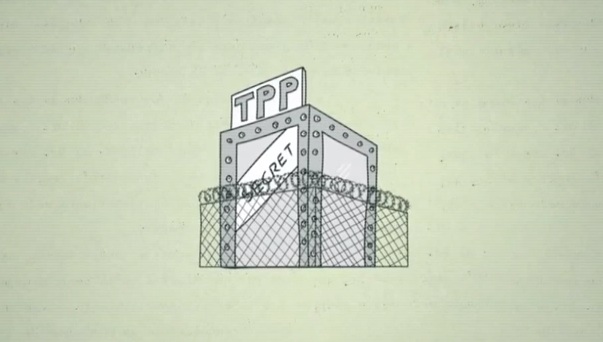This week’s Asia-Pacific Economic Cooperation (APEC) summit in Indonesia was supposed to be an opportunity for leaders of Trans-Pacific Partnership countries to assess the situation, make political bargains and reaffirm their shared commitment to finishing the secret negotiations by the end of 2013. U.S. President Obama said he won’t be able to make the summit because of the ongoing government shutdown, but to go on ahead without him.
Business groups are worried what this will mean for the TPP side-meeting in Bali, though Secretary of State John Kerry will be there in Obama’s stead, but the presidential no-show could be the least of the TPP’s worries, according to several articles last week.
But first, the exciting stuff…
Last week, U.S. trade justice activists with Flush the TPP, Backbone Campaign, Popular Resistance and other groups were somehow able to march right up to (and onto) the offices of U.S. Trade Representative Michael Froman where they delivered a dangling message of opposition to the 12-country corporate rights treaty (see video). The activists had been scoping the building for a month, noticing that the door to the scaffolding attached to USTR was always open, says a Washington Post blog.
“But when they arrived on Monday, wearing their ‘Stop the TPP’ hats,” writes Post blogger Al Kamen, “he (PopularResistance.org organizer Kevin Zeese) said, ‘we were shocked that there were no workers, no security. It was amazing.’ ‘We wanted to do something audacious,’ Zeese said, ‘we wanted to be bold.’ Indeed.”
The growing Flush the TPP campaign, as well as groups like Public Citizen and the Citizens Trade Campaign, are trying to convince U.S. congress not to approve a fast-track bill that would give Obama the ability to approve an eventual trans-pacific trade deal without a thorough congressional screening. The campaigns are having an impact.
Last week, Alan Grayson, a Florida Democrat whose website tradetreachery.com lets people endorse a statement opposing investor-state dispute settlement in the U.S.-European Union trade deal, said, “We may never see fast track on the floor of the house because it may never have the votes,” according to Inside U.S. Trade (subscription only). “The opposition is significant enough.”
Grayson, who has seen the draft TPP agreement, told the online trade journal that while it’s too early to tell how many Democrats will vote against the TPP, “I think you might see [an] alliance develop among both Democrats and Republicans who apply a common-sense test.” They may unite to oppose any deal that would “undermine U.S. sovereignty,” he added.
So when might Grayson and friends have the opportunity to make that call? According to Froman, the TPP negotiations are in their “end game.” But Public Citizen pours a bucket or two of cold water over those optimistic comments in an October 3 blog post on the remaining bracketed text or otherwise unresolved chapters in the deal. It’s worth a read, but to summarize (in their words):
– Entire patent section of Intellectual Property chapter and text on medicine pricing rules both deadlocked
– Deadlock over enforceability of labor rights
– Environment chapter at an impasse
– Deadlock over the State Owned Enterprises (SOE) text
– United opposition to the U.S. demand that TPP ban the use of capital controls
– Deadlocks over various aspects of controversial “investor-state” private corporate enforcement of TPP
– Negotiations on sensitive Market Access issues not even started
– Impasse on Copyright Rules
– Negotiations on Currency Disciplines Not Even Started
Here in Canada, resistance to the TPP’s copyright and Internet rules is building very quickly. OpenMedia.ca has collected more than 100,000 signatures on a letter to TPP heads of state asking them to Say No To Internet Censorship. You can read and sign the statement here.
“We know from leaked drafts that the TPP will make the Internet more expensive, censored, and policed,” explains OpenMedia. “Experts say, ‘kids could be sent to jail for downloading’ and whole families could be kicked off the Internet.”
The NDP, inspired by Rep. Grayson’s successful campaign to get copies of the TPP texts, has launched a petition to “demand that Stephen Harper’s Conservatives release the details of the TPP and ensure more transparency in all future trade agreements.” You can sign that petition here.
Meanwhile, Doctors Without Borders and other health advocacy groups are warning TPP countries not to swallow the latest U.S. proposal on pharmaceutical patent protection.
“Nobody should be fooled by this latest U.S. proposal, which purports to lessen the negative impact this trade deal will have on access to medicines in the poorest countries in the negotiations,” said Judit Rius, manager of MSF’s Access Campaign in the U.S., quoted in the Jakarta Post. “This is still a terrible deal that will continue to delay the entry of affordable generic medicines that MSF and millions of people rely on.”
Like in the Canada-European Union trade and investment deal negotiations, the TPP would extend patent protections for brand name drug companies. But the TPP will go further by making it more difficult for countries to regulate the price of drugs, and create whole new categories of things that can be patented (e.g. therapeutic methods) with the effect of making health costs, especially for developing countries, unsustainable.
With all the built-in problems with the TPP, the growing opposition (e.g. from Nobel laureate Joseph Stiglitz or in much of Malaysia), and these negotiations being the big game in town for extending the NAFTA+ corporate rights regime into Asia, it’s strange to see so many big business voices in Canada almost blaming Prime Minister Harper for the delays. No, there will be no magic omnibus bill to make the TPP happen (thank god) for Harper.




